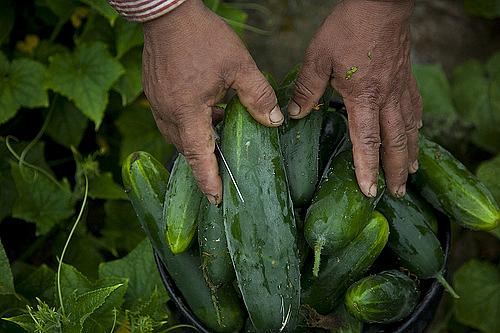Migrant Workers' Forum Highlights Need for Change
Hoy is engaged in a year-long project looking at the health challenges of Latino workers and communities in the Midwest as well as the degree to which enforcement agencies are, or are not, protecting them. This forum, which was conducted as part of Jeff Kelly Lowenstein's California Endowment Health Journalism Fellowship, examined the exploitation of migrant workers, many of whom are undocumented immigrants.

At Hoy we are engaged in a year-long project looking at Latino workers and communities in the Midwest and the degree to which enforcement agencies are, or are not, protecting them.
Thus far, we can say that at the federal level it's not a pretty story.
Take Wright County Egg, for example.
The company from Galt, Iowa with roots in Maine had a more than 30-year history of nearly every kind of abuse before last year's record-breaking recall of 380 million eggs.
We are talking extensive and repeated violations of workers' rights documented by OSHA.
Environmental despoliation for which the EPA fined them.
In 2002 the EEOC punished the company after identifying and documenting a pattern of sexual harassment and even sexual assault of its female employees, many of whom were Mexican women.
That's to say nothing of the more than $1 million the federal government fined them for hiring undocumented workers.
Yet, despite having enough red flags to blanket the world's largest bullfighting stadium, the company did not have to shut down operations until some consumers got sick, prompting last year's recall.
Here in Illinois, though, a band of advocates, family members and government agencies are working to create a different story.
Some of them gathered at a public forum at Northern Illinois University last Tuesday night to talk, to listen and to begin to formulate a plan for inter-agency collaboration.
The event came on the heels of an October 12 special state senate hearing about the condition of migrant workers convened by Sen. Mike Frerichs (D-52).
Part of the impetus for the meeting came from the work many of these people did to shut down the notorious Cherry Orchard apartment complex in Rantoul.
As our collaborators at Citizen-Access, a publication and project based at the University of Illinois Urbana-Champaign ably showed, the conditions in which the migrant workers were housed were horrific.
No legally functioning sewage system.
Holes in the wall.
No water or power for weeks at a time.
It wasn't easy and took about four years, but this ad hoc coalition did succeed in closing Cherry Orchard.
But, as Julie Pryde, a self-described "accidental activist" and public health administrator in the area noted in an interview we published, this action, while a success, did not solve the larger problem.
Which is why people came together on Tuesday.
Facilitated by Susan Bauer, a longtime migrant worker advocate, the panel included Mattae Kamara, a family doctor based in Chicago who does medical work with farm workers, academic Bob Aherin, lawyer Miguel Keberlein, and representatives from the Mexican government and from OSHA.
As much expertise as they had to offer, though, each panelist talked about the emotional impact of the testimony they heard from relatives and friends of workers who died recently.
As you can hear, Kamara's voice cracked as she offered her comments.
She was not the only one whose eyes watered.
Keberlein made the point after the panel ended that the deaths that occur are an extreme aspect of daily indignities and oppression the workers endure.
Several of the speakers took pains to emphasize that not all employers treat their workers poorly, and, further, that some formerly abusive bosses can change their practices.
At this point, the specifics of a legislative agenda and the form of inter-agency collaboration are not clear.
There is urgency to arrive at the clarity soon, according to Jovanna Chavez.
A 17-year-old high school junior who has friends who work in the fields, she declared that, absent concrete action, the articulate words offered by those in the room would be just that -- words.
People in the room appeared willing to accept Chavez's challenge.
We'll continue to follow this issue and to report on the evolution of this new and potentially different approach toward worker and community safety.
In the meantime, we want to hear from you.
What should we be covering? What has been your experience with worker safety? How have you found the interactions between state agencies?
This article was first published on The Huffington Post
Image by Bread for the World via Flickr

